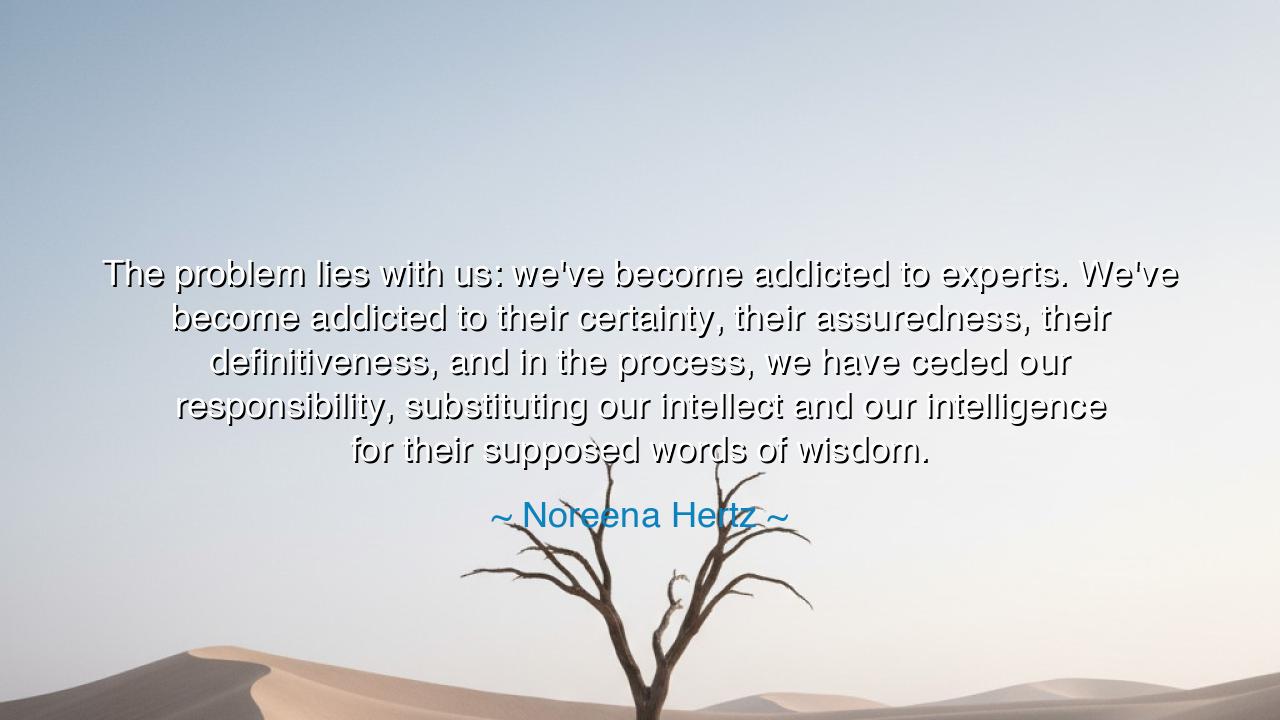
The problem lies with us: we've become addicted to experts. We've
The problem lies with us: we've become addicted to experts. We've become addicted to their certainty, their assuredness, their definitiveness, and in the process, we have ceded our responsibility, substituting our intellect and our intelligence for their supposed words of wisdom.






Hearken, children of reflection, and attend to the words of Noreena Hertz, a voice calling for vigilance of the mind: “The problem lies with us: we've become addicted to experts. We've become addicted to their certainty, their assuredness, their definitiveness, and in the process, we have ceded our responsibility, substituting our intellect and our intelligence for their supposed words of wisdom.” Pause upon these words, for they reveal a truth both timeless and piercing: the surrender of one’s own judgment to the allure of authority diminishes the human spirit and corrodes the very essence of responsibility.
Hertz begins with the recognition of an insidious tendency: the addiction to experts. From the courts of kings to modern institutions, humans have long sought guidance from those deemed learned. Yet when admiration becomes dependence, the intellect is ceded, and responsibility is transferred from the self to the supposed wisdom of others. This is no mere habit—it is a surrender of autonomy, a relinquishing of the sacred duty to reason, discern, and act with conscience.
History offers mirrors of this principle. Consider the unquestioned obedience to authority that preceded catastrophic events, such as the misjudgments that led to the Titanic’s disaster. Engineers and captains relied on the presumed expertise of charts, measurements, and technology, yet failed to question, to probe, to exercise discernment. The blind faith in assuredness and certainty produced tragedy, reminding us that wisdom unexamined is not wisdom at all.
Even in governance, Hertz’s warning resonates. The collapse of financial systems, precipitated by unchecked reliance on economists and analysts, demonstrates the danger of substituting personal responsibility for the opinions of the learned. Citizens and leaders alike trusted the definitiveness of experts without critical scrutiny, yielding decisions that affected millions. Here, as in all ages, the danger lies not in knowledge itself, but in the abdication of one’s own intellect in favor of external authority.
The essence of Hertz’s insight lies in responsibility and vigilance. To respect expertise is wise; to depend upon it unquestioningly is perilous. The ancients taught that knowledge must be filtered through reason, tempered by judgment, and weighed against experience and reflection. Blind obedience may offer comfort, but it strips the soul of agency and the mind of discernment. True mastery of life requires the integration of counsel with independent thought, not its substitution.
Practical wisdom emerges from this reflection. Cultivate your own capacity to evaluate, reason, and judge. When encountering expert advice, listen, but question. Compare, cross-examine, and measure their words against your understanding and observation. By exercising critical thought, you honor your intellect and preserve the sacred duty of personal responsibility, ensuring that guidance enriches rather than dominates your reasoning.
Moreover, this reflection reminds us that society flourishes when citizens engage actively with knowledge. A populace addicted to certainty is vulnerable to manipulation, fear, and error. Hertz’s counsel is a call to awaken collective vigilance, to encourage inquiry, debate, and the courage to dissent when required. Intellectual independence is the cornerstone of freedom, wisdom, and progress.
Therefore, generations to come, remember Noreena Hertz’s counsel: we have ceded our responsibility when we substitute our intellect for the assured words of experts. Honor guidance, but cultivate judgment. Question, reflect, and act with conscience. In doing so, you safeguard your autonomy, strengthen the capacity for reason, and ensure that knowledge serves humanity rather than enslaving it. Let no voice of certainty supplant the power of your own intelligence, for in your vigilance lies both freedom and the enduring light of wisdom.
If you wish, I can also craft a more poetic, allegorical version of this reflection, portraying experts as distant stars and human intellect as a flame that must navigate its own path, suitable for meditative or heroic narration. Do you want me to do that?






AAdministratorAdministrator
Welcome, honored guests. Please leave a comment, we will respond soon